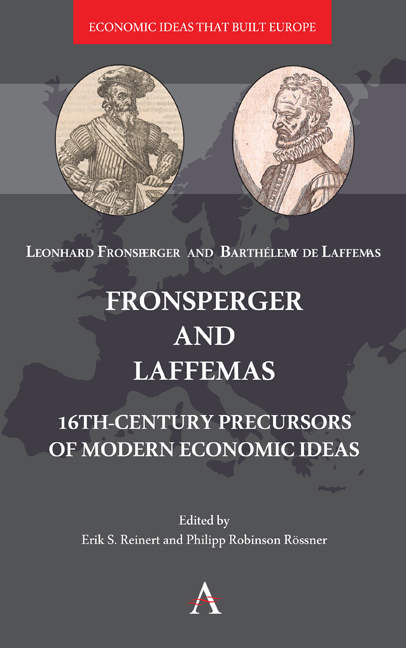Book contents
- Frontmatter
- Contents
- Introduction
- 1 Barthélemy de Laffemas (1545–CA. 1611) as an Early Economist: Context and Scholarly Voices in the English-language Literature
- 2 General Regulation for the Establishment of Manufactures (1597)
- 3 Leonhard Fronsperger (1520–CA. 1575) as an Early Apology of the Market Economy
- 4 Leonhard Fronsperger ‘On the Praise of Self-Interest’ (1564)
1 - Barthélemy de Laffemas (1545–CA. 1611) as an Early Economist: Context and Scholarly Voices in the English-language Literature
Published online by Cambridge University Press: 28 February 2024
- Frontmatter
- Contents
- Introduction
- 1 Barthélemy de Laffemas (1545–CA. 1611) as an Early Economist: Context and Scholarly Voices in the English-language Literature
- 2 General Regulation for the Establishment of Manufactures (1597)
- 3 Leonhard Fronsperger (1520–CA. 1575) as an Early Apology of the Market Economy
- 4 Leonhard Fronsperger ‘On the Praise of Self-Interest’ (1564)
Summary
Context
Laffemas’ work takes us back to the early beginnings of political economy, and – as part of that Zeitgeist – an emphasis on manufacturing as an indispensable ingredient. Laffemas came to the fore when the fiscal-military state was still in the making but took more and more visible shape; during that time an economic ideology grew ground which established, in economic reasoning as well as practice, a connection between state consolidation and the raising of the wealth of the nation: in order to generate a better, stronger state apparatus, the economy needed some attention as well. Economic policy often took the shape of merchants and other economic actors asking for privileges and monopolies, but Laffemas’ text presents an understanding that policy ought to be more than rent seeking serving the interest of the few. Policy was to feed on a mutual relationship or symbiosis: a strong manufacturing economy was the foundation of a strong state, and vice versa. The best way to curb domestic factionalism, monopoly and rent seeking, and to defend France's political and economic interest internationally was to promote domestic economic growth. During the process industry was identified as a key candidate to achieve this simultaneous strengthening of the nation's power and its wealth, and the main source of the wealth of nations – the birth of modern political economy.
This is borne out in the further works in Laffemas’ oeuvre and career as a writer and ‘consultant administrator’ (using Schumpeter's famous classification), in which he often returned to themes including the dichotomy of agriculture and manufacturing as two very different forms of economic activity, with radically different chances for the growth potential of the nation's wealth. Laffemas also sported an anti-bullionist perspective, never confusing – as a very common allegation against ‘mercantilism’ goes – money with real wealth, advocating for free money flows in and out of the country instead. With his emphasis on import substitution, the prohibition of vital raw material exports (which better be worked into manufactures domestically), promoting manufacturing and national productivity, stimulating domestic employment, increasing ‘industry’ (at that time still meaning industriousness or, in German, Fleiss) across the French lands, encouraging the immigration of skilled foreigners (technology transfer) Laffemas’ work classifies as ‘mercantilist’ in the traditional sense, but also matches Cameralist economic thought.
- Type
- Chapter
- Information
- Fronsperger and Laffemas16th-Century Precursors of Modern Economic Ideas, pp. 1 - 16Publisher: Anthem PressPrint publication year: 2023



